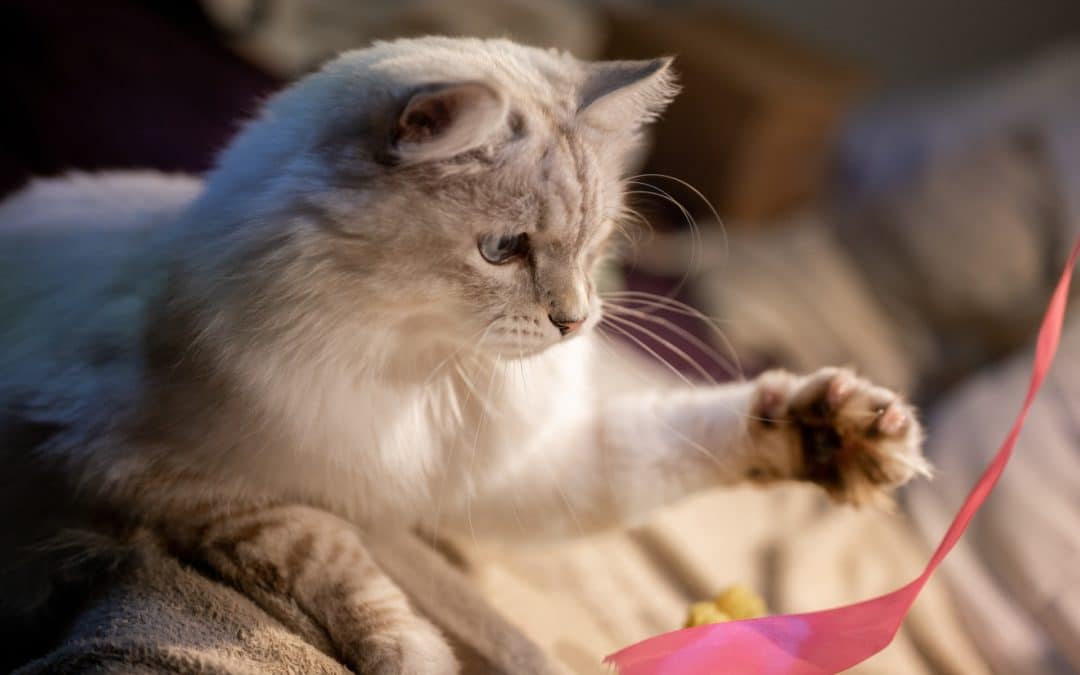Even if it seems like they’re content to spend most of the day sleeping, indoor cats do need exercise. It keeps their joints and muscles healthy and it keeps them from packing on the pounds. Daily exercise provides mental stimulation, promotes good health, and prevents obesity in cats. It can even help you and your cat build a stronger bond. Here’s how to make sure your pet is getting enough exercise.
How Much Exercise Do Cats Need?
Cats are naturally athletic—their little bodies are built for sprinting, jumping, and climbing. In the wild, their athletic ability is what keeps them alive and fed. For domestic cats, exercise is necessary to prevent excessive weight gain and to satisfy their innate hunting instincts.
On average, a cat needs about 30 minutes of exercise every day. But since cats tend to conserve their energy so they can use it in bursts, it’s best to break up that 30 minutes into two or three sessions. Give your cat a little exercise at least twice a day, and try to do it at the times when they are most active, like early in the morning and just after sunset.
If your cat has a tendency to get the zoomies in the middle of the night, they’re definitely getting some exercise in. But it’s still a good idea to build up a habit of playing with your cat every morning and evening. That way when they get older, they’ll be accustomed to regular exercise. Plus, interactive play also strengthens your emotional bond with your pet.
How to Prevent Obesity in Cats
Chonky cats may be adorable, but obesity can actually cause all kinds of medical problems.
It contributes to chronic diseases like diabetes and arthritis that can be very painful for your cat. However, with daily exercise and portion control, you can prevent obesity and keep your cat healthy.
Here are some tips for managing your cat’s weight:
- If your cat is not the only pet, make sure that they can’t get access to the other pets’ food. Then set a strict feeding schedule and monitor your pets to make sure they are only eating their own portions.
- Is your cat the type to devour their entire dish of food as soon as it’s served, and then beg for more? It might be better to schedule multiple small meals instead of one or two. With an automatic cat feeder, you can set a timer that will release small portions when you’re away at work or at night when you’re sleeping.
- When it comes to exercise, try to stick to a schedule as well. If you consistently play with your cat every morning and evening, they’ll grow to expect the attention and look forward to it. But anytime is a good time for a quick burst of play—if your cat is acting feisty (and it’s not 4 a.m.) take a few minutes to wiggle their favorite string toy around.
- Do you have a food-motivated cat? Try enticing them to play with a treat toy, or reward them with a small treat after their daily exercise.
- If your cat is already overweight, talk to a vet about how much food and exercise are appropriate. They can advise you on the best type of food and portion size for your cat, and on the best times to schedule their feedings. They can also give you some tips on exercising your cat to prevent weight gain.
Dedicated Veterinary Care in Gilbert
Playing with your cat every day strengthens your bond with your pet, keeps them from getting bored, and helps them stay healthy. The team at Anasazi Animal Clinic is here to help your cat maintain the best of health. If you have questions about feeding or exercising your cat, please ask us at your next visit. To make an appointment, just send us a message or give us a call at 480-497-0505 today.
Photo by Piotr Musioł on Unsplash used with permission under the Creative Commons license for commercial use 12/27/2023.

